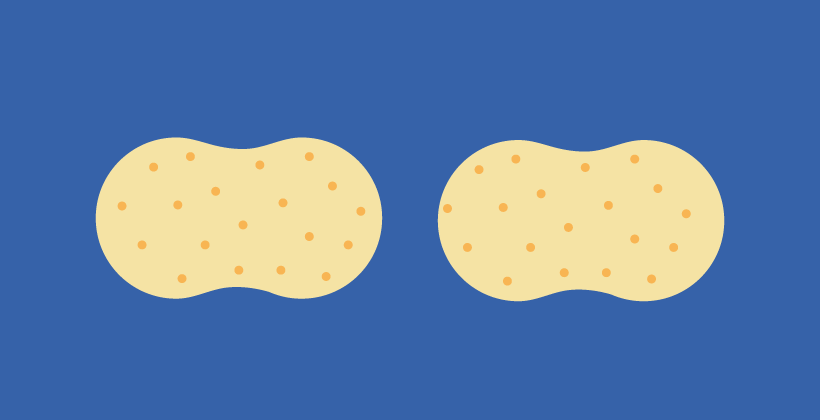Do carbohydrates make you gain weight?
Last Updated : 28 June 2024
Carbohydrates are the sugars, starches, and dietary fibres found in the foods we eat every day, such as fruits, vegetables, cereals, pulses, root crops, dairy, and sweeteners. Carbohydrates are broken down by our body into simple sugars (glucose and galactose) that are absorbed into the bloodstream and used as the primary energy source to fuel our brain, muscles and all other cells. Alternatively, they can be stored as glycogen in the liver and muscles for future use. Carbohydrates supply 4 kilocalories per gram of food (like proteins).
Weight gain results from an imbalance between calories consumed and calories used by our bodies. Eating more calories than the body needs leads to fat storage and weight gain over time, regardless of the nutrient source. However, some claim that carbohydrates are particularly bad for us, arguing that high glycaemic load diets (diets high in foods with a large amount of carbohydrates per portion and which have a high glycaemic index) are the main driver of increasing obesity prevalence. They suggest high glycaemic-load diets lead to excess insulin secretion, accumulation of body fat, and increased appetite resulting in higher energy intakes compared to low glycaemic-load diets. However, numerous studies refute this model, highlighting that fat storage can occur without dietary carbohydrates, and insulin secretion is influenced by various other factors. Moreover, interventions have shown that low-glycaemic-load diets do not consistently result in more significant weight loss compared to high-glycaemic load diets.1
Leading international agencies, such as FAO/WHO and the UK’s Scientific Advisory Committee on Nutrition, affirm that high-carbohydrate diets do not increase obesity risk.2,3Large studies indicate that low- and very-low-carbohydrate diets are not superior to other dietary approaches for weight loss.4,6
However, the type of carbohydrates we choose to include in our diets is crucial. When examining specific carbohydrate groups like free sugars and dietary fibres, we see that their impact on body weight varies.4,7,14 While insufficient evidence exists regarding added and free sugar intake and body weight, a connection has been noted between soft drink consumption and increased body weight among children and adolescents. Dietary fibre, on the other hand, plays a role in feeling satiated after meals, so preventing people from overeating and helping maintain a healthy body weight.
The reason for why some people may experience initial weight loss when cutting out carbohydrates is because they also lose water weight.5 Among other mechanisms, restricting carbohydrates depletes glycogen stores. Each gram of glycogen is stored with approximately 3 grams of water. In turn, this glycogen with bound water will be excreted in urine, resulting in weight loss. However, this is not the same as fat loss and after a few weeks weight loss will plateau. The effect will also be reversed once the diet is stopped. People on low-carbohydrate diets may also inadvertently eat fewer calories or adopt other healthy lifestyle changes contributing to weight loss.
Takeaway
- Dietary carbohydrates are not the primary driver of obesity. Weight gain results from overall caloric imbalance (e.g., regularly consuming more energy than we burn over long periods).
- Some argue that low-carbohydrate diets may aid weight loss by reducing insulin secretion and appetite, but scientific evidence does not support this model.
- Cutting out carbohydrates may lead to nutrient deficiencies, health risks, and a negative relationship with food.5
- The European Food Safety Authority (EFSA) recommends adults should get around 45-60% of their daily calories from carbohydrates, of which as little as possible added and free sugars and at least 25 grams of dietary fibre, to reduce the risk of non-communicable disease and manage your weight.
- To manage your weight, choose nutrient-dense foods, make water or unsweetened beverages your drink of choice, and limit foods and drinks high in fat, sugar, and salt – check the nutrition label to help identify these.
References
- Hall, K. D., Farooqi, I. S., Friedman, J. M., Klein, S., Loos, R. J., Mangelsdorf, D. J., ... & Tobias, D. K. (2022). The energy balance model of obesity: beyond calories in, calories out. The American Journal of Clinical Nutrition, 115(5), 1243-1254.
- Scientific Advisory Committee on Nutrition (2015). Carbohydrates and health. London, United Kingdom: Public Health England.
- Scientific Advisory Committee on Nutrition (2015). Carbohydrates and health. London, United Kingdom: Public Health England.
- WHO/FAO (2013). Joint FAO/WHO scientific update on carbohydrates in human nutrition. European Journal of Clinical Nutrition 61(S1):1-137.
- Kirkpatrick, C. F., Bolick, J. P., Kris-Etherton, P. M., Sikand, G., Aspry, K. E., Soffer, D. E., ... & Maki, K. C. (2019). Review of current evidence and clinical recommendations on the effects of low-carbohydrate and very-low-carbohydrate (including k
- Naude, C. E., Brand, A., Schoonees, A., Nguyen, K. A., Chaplin, M., & Volmink, J. (2022). Low‐carbohydrate versus balanced‐carbohydrate diets for reducing weight and cardiovascular risk. Cochrane Database of Systematic Reviews, (1).
- European Commission JRC Knowledge Gateway: Health Promotion and Disease Prevention. Accessed: 17 October 2019.
- EFSA Panel on Dietetic Products, Nutrition and Allergies (2010). Scientific opinion on dietary reference values for carbohydrates and dietary fibre. EFSA Journal 8(3).
- Hauner H, et al. (2012). Evidence-based guideline of the German Nutrition Society: carbohydrate intake and prevention of nutrition-related diseases. Annals of Nutrition and Metabolism 60 (S1):1-58.
- van Dam RM & Seidell JC (2007). Carbohydrate intake and obesity. European Journal of Clinical Nutrition 61:S75-S99.
- Luger M, et al. (2017). Sugar-sweetened beverages and weight gain in children and adults: a systematic review from 2013 to 2015 and a comparison with previous studies. Obesity Facts 10:674-693.
- Hardy LL, et al. (2018). Association between adolescents’ consumption of total and different types of sugar-sweetened beverages with oral health impacts and weight status. Australian and New Zealand Journal of Public Health 42:22-28.
- ANSES (2016). Opinion of the French Agency for Food, Environmental and Occupational Health and Safety (ANSES) on the establishment of recommendations on sugar intake. Accessed 17 October 2019.
- Veronese N, et al. (2018). Dietary fiber and health outcomes: an umbrella review of systematic reviews and meta-analyses. American Journal of Clinical Nutrition 107:436-444.



